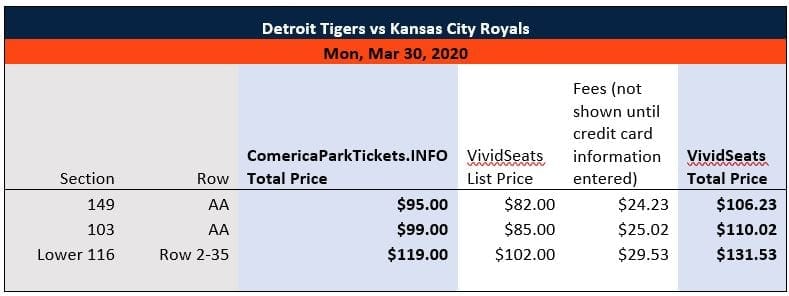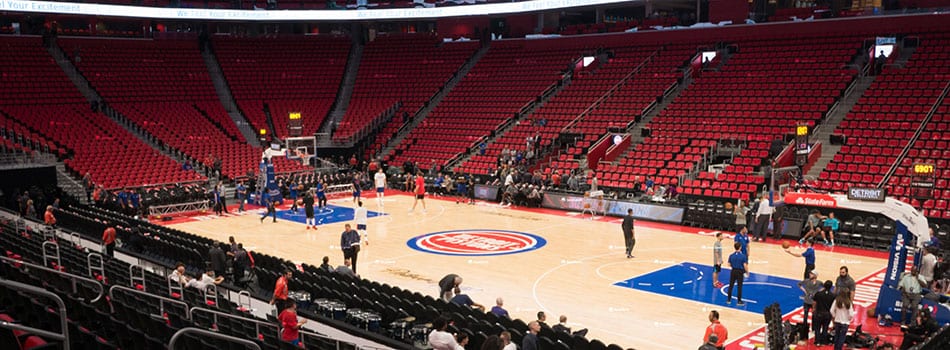Updated 1:43PM Friday October 25
A pair of bills currently under consideration by the Michigan legislature go a long way towards correcting some antiquated code in the state. Unfortunately, lobbying efforts by some of the largest entertainment corporations in the world look to be pushing the language into places where venues and large ticket exchanges could see competitive advantages written into the very laws of the state.
Michigan Senate bills SB384 and SB385, in their current form, serve a core purpose of removing the legal penalty for consumers and businesses looking to offer tickets for resale in the state. Currently, selling any ticket for above face value in Michigan is a misdemeanor. The proposed legislation strikes that from the books, which is obviously a step in the right direction in a modern ticketing ecosystem. But not all the news is good. With needless provisions against the use of common search terms in website URLs and redundant anti-“bot” penalties, the proposed legislation could be stacking the deck against consumers and small-scale ticket resale operators without the deep pockets to lobby for themselves.
The bill, in current form, has prohibitions against the use of venue or artist names in the URL of any website involved in ticket resale. Who would win if the bills pass as written? The largest corporations who have spent countless millions of dollars building their brand stand to get the most benefit. Smaller exchanges who rely on searchable domain names could be shut down. This has minority groups enraged. In written public testimony, Scot Esdaile of USMTG writes, “By prohibiting the ability for ticket sellers to list the event and venue name within their URL, the marketplace will continue to become monopolized by large corporations as consumers searching for a specific event will be led to the websites with exclusive contracts with venues.”
“This is going to create a very unfair advantage for the big corporations”, says Peter Tyrrell, a business adviser for ComericaParkTickets.INFO. “We are seeking to help the consumer in unbiased, equitable way by surfacing things to do, places to stay, and inviting visitors to make reservations at restaurants in Detroit. He continues, “There is no deception going on. In very conspicuous and prominent areas, we are make sure the visitor knows that they are not on the official venue site. Our site is intended to be more informational.”
There is also the question of fees. Companies such as Ticketmaster and StubHub have long been accused of deceptive pricing – “drip” pricing, in the way that the actual price is held back from consumers until after payment information is entered. Draft bills submitted by lobbyists for Ticketmaster in their attempts at making things harder for competition included protections for these widely-reviled deceptive practices.
In a recent episode of TruTV’s Adam Ruins Everything, Adam Conover took aim at TicketMaster and Live Nation exposing how they leverage a virtual monopoly to extract exorbitant fees from consumers. Sites like Megaseats.com, whose business model is not to charge fees at all could also be negatively impacted by a law restricting the ability to sell tickets above face value. In many cases, the smaller exchanges are significant less than the large corporation who would benefit from the passing of SB384 and SB385:
Here is a price audit from 10/22/2019:

Graphic courtesy ComericaParkTickets.INFO
Consider for a second that if you buy a ticket from the major corporations and pay face value plus shipping fee, digital fee, service fee, convenience fee and whatever else is piled on top, you might not legally be able to recoup any of those fees when you “resold” the ticket to your friend. Recently it was reported that Sir Elton John was selling his own tickets for 8x face value plus fees.
“These bills are legislative theater.” says an anonymous source, “Instead of capitalizing on the generally negative perception of ‘scalpers’, they should focus on the rot inside the concert industry.”
Scot Esdaile and his team at United State Minority Ticketing Group have put forth a 12 point plan with detail in the legislators’ hands. Common sense reforms like requiring transparency and standardized disclosures for consumers are two points. Other items that are becoming a growing problem are provisions to protect consumer privacy and to restrict third party data sharing.
This twelve point plan has been copied here to help solve the real issues behind the event ticketing industry.
Courtesy Scot Esdaile and USMTG:
Core Consumer Issues in Ticketing
Outlined below are 12 practices in ticketing that need updating to transform the current ticketing ecosystem into one where consumers are treated fairly and equitably at all points of the purchase and use process. Links to stories supporting these positions are provided where applicable.
- Require Free Transferability of Tickets
Paperless ticketing is the practice of selling tickets which are non-transferable to another consumer. Paperless ticketing occurs when a consumer buys a ticket and is only allowed entry to an event with an ID or credit card attached to the person who originally purchased the ticket. Consumers deserve to have the right to do whatever they wish with their ticket once it is purchased. We propose that a permanent ban be placed on selling paperless tickets exclusively to an event.
More:
Paperless Tickets Costly to Consumers – American Consumer Institute Center for Citizen Research: https://www.theamericanconsumer.org/wp-content/uploads/2014/03/paperless-tix-CG.pdf
Hundreds Locked Out of Black Keys Show After Non-Disclosed Removal of Ticket Transfer Rights: https://www.ticketnews.com/2019/09/safetix-hundreds-locked-black-keys-wiltern/ and https://www.ticketnews.com/2019/09/black-keys-wiltern-transfer-disclosure-missing/
- Require Transparency
The secondary market is blamed when event tickets sell out seemingly instantaneously and consumers are left confused without any options. This phenomenon is largely due to the entities that regulate admission to events. Those who operate places of entertainment often hold back 40-60% of tickets for promoters, artists, venues and VIP’s to purchase or sell. Therefore, we propose a law disclosing the total number of tickets available and how many are available for the general public.
More:
Ticket Buying Tips – “Ticket Presales and holdbacks can amount to up to 90 percent of the total tickets, leaving only 10 percent available to the general public” – http://www.startribune.com/tips-for-buying-concert-tickets/201307041/
“I’m getting ripped off’: A look inside Ticketmaster’s price-hiking bag of tricks – https://www.cbc.ca/news/business/ticketmaster-prices-scalpers-bruno-mars-1.4826914
- Standardize Disclosures
Current ticket resale laws hold standards for disclosures on the secondary market that the primary seller is exempt from. The secondary market is held accountable for disclosing the face value of a ticket and money back guarantees. We propose standardizing all disclosures for both the secondary and primary market, including transparency on the face value of a ticket, money back guarantees and displaying ticket prices.
More:
How Ticket fees got so bad and why they won’t get better – https://www.vox.com/the-goods/2019/6/12/18662992/ticket-fees-ticketmaster-stubhub-ftc-regulation
Ontario drops proposed ticket transparency rules (after industry threats): https://www.iq-mag.net/2017/11/ontario-drops-proposed-ticket-transparency-rules/#.XZ4dclVKhEY
- Ensure Free & Equal Access to Internet Marketing
Companies like Google, StubHub, eBay and Vivid Seats have raised advertising costs for small businesses through the use of private label marketing systems. It is unlawful for search engines to discriminate against small businesses by engaging in unfair practices designed to bias search content in favor of Internet content providers paying the highest advertising fees.
More:
Google Ads Ticket Resale Policies – https://www.blog.google/products/ads/update-ticket-reseller-policy/
Compliance with New Adwords Resale Policy Spotty at Best – https://www.ticketnews.com/2018/02/adwords-ticket-resale-policy-compliance-spotty/
- Ban URL Restrictions
Currently, there are restrictions on retailer’s use of URL descriptors. This inhibits smaller businesses from using clear language to describe the event, artist or venue. By prohibiting retailers from properly and clearly marketing the tickets being sold, this bill disadvantages smaller ticketing business compared to larger competitors. In addition, it prohibits online advertising while harming consumer’s ability to accurately search for tickets at fair prices. We propose allowing ticket resellers to fairly use descriptive language in order to advertise to the general public.
More:
Google Cracking Down With New AdWords Rules – http://www.ampthemag.com/top-story/google-cracking-deceptive-ticket-resale-sites-new-adwords-rules/
- Ban Ticket Price Floors
Various teams and events have mandated that a ticket cannot be sold or resold below a team or promoter-determined ticket price. Ultimately, this prevents sellers from lowering ticket prices, which in effect raises prices on the market and creates a restraint on free trade. We propose banning a minimum price on all tickets.
More:
NFL ticket price floors subverting the market clearing prices – https://blogs.cornell.edu/info2040/2014/09/22/nfl-ticket-price-floors-subverting-the-market-clearing-prices/
NFL floor pricing sends fans to secondary market for $20 million in savings – https://www.ticketnews.com/2017/05/nfl-floor-pricing-sends-fans-to-secondary-market-for-20-million-in-savings/
Ed Sheeran in hot water over resale price restrictions harming fans – https://www.ticketnews.com/2019/09/ed-sheeran-resale-restrictions-harming-fans/
- End Genre Restrictions
Venues impose restrictions on ticket distribution on certain genres and not others. Operators of places of entertainment cannot selectively apply certain terms or conditions to one event and not others depending on the kind of event. This includes concerts, musical performances, theatre productions, sporting events and all other entertainment events. We propose banning venues from imposing restrictions on ticket distribution for certain genres.
- End Exorbitant License and Bond Fees
Several states, such as New Jersey and New York, have exorbitant licensing and bonding fees attached to annual applications for ticket resellers. These high costs are major barriers to smaller businesses and acts as a disincentive to smaller ticket resellers from registering within the state. We advocate that fees be reduced no more than $100.
More:
New York Ticketing Laws – New Normal – https://www.ticketnews.com/2018/06/new-york-ticket-laws-changing-analysis/
TodayTix a symptom of “broker” double-standard in New York – https://www.ticketnews.com/2018/08/todaytix-symptom-ticket-broker-double-standard-in-new-york/
- End Venue-Proximity Restrictions
In many states, ticket resellers cannot operate within a certain distance of a venue. These distances are arbitrary and do not protect consumers. The closer to the venue that a consumer is, the safer their purchases will be as they can check the legitimacy of a ticket at the venue. In addition, these laws are unfair to tax paying and registered ticket sellers, especially when many places of entertainment are funded by tax payers.
More:
Police arrest four in Omaha while online resale continues unfettered – https://www.ticketnews.com/2018/03/omaha-police-arrest-four-scalpers/
- Outlaw Exclusive Ticketing Contracts
Places of entertainment are often funded by tax payers and should be open for all brokers to participate with. Exclusive contracts between publicly funded venues and primary marketplaces restrict small businesses from doing business with the venue. This is especially unfair when the broker is a paying for that venue to operate through taxes. We propose restricting public funded venues and organizations from creating exclusive contracts with ticket sellers and resellers.
More:
Live Nation rules music ticketing, some way with threats – https:/www.nytimes.com/2018/04/01/arts/music/live-nation-ticketmaster.html
Senators ask for antitrust probe in concert ticketing – https://www.nytimes.com/2019/08/28/arts/live-nation-tickets-regulation.html
- Restrict Third Party Data-Sharing Agreements
Ticket sellers, such as Ticket Master, share customer information with the venue, team, artist, or league without consent from the customer. This breaches consumer privacy on every level. We propose that ticket sellers must have information sharing agreements with resellers, marketplaces and exchanges before sharing that information with third parties, including venues, artists, teams, leagues, etc.
More:
Q&A W/Ticketmaster President Jared Smith – “SafeTix, which utilizes secure NFC and dynamic … means we can now offer our artists, team and venue clients the opportunity to build much more personalized and meaningful relationships starting with event recommendations and continuing to the event experience itself.” – https://www.adweek.com/programmatic/qa-ticketmasters-president-jared-smith-talks-ad-tech/
Ticketing App AXS scapes everything it can get from your phone – https://theoutline.com/post/5628/how-a-concert-ticket-steals-your-personal-data?zd=1&zi=qr4drniw
- Improve Consumer Protection on Personal Data
Currently, ticket consumers cannot control how their personal information is being used by ticket resellers. Most commonly, the original consumer’s name and other personal information is printed on the ticket. We propose that it is unlawful for the operator or ticketing service to print any personally identifiable information of a customer on a ticket to an event, unless the customer is able to remove or obscure the information on the ticket.
More:
Ticketing App AXS scapes everything it can get from your phone – https://theoutline.com/post/5628/how-a-concert-ticket-steals-your-personal-data?zd=1&zi=qr4drniw
Ticketmaster to roll out facial recognition, sparking privacy concerns – https://www.thedailybeast.com/brave-new-world-ticketmaster-to-roll-out-facial-recognition-sparking-privacy-concerns



